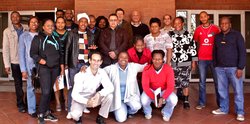28 May 2014
People of Steve Tshwete reinforce their vision for a low emission future



From 25-26 May 2014 in an engaging and productive workshop, a range of stakeholders came together to create a vision and next steps towards the preferred future scenario for the region.

The one-and-a-half-day intensive workshop was the second of two exciting scenario planning exercises designed to bring local people together around a common vision for sustainable, low-emission growth and prosperity in the region. The session was co-facilitated by futurist and urban planner, Shahid Solomon of Novation 2050, and ICLEI – Local Governments for Sustainability- Africa Low-emission development involves making decisions now that can reduce local air pollution, and energy use, as well as create jobs and investment opportunities in the long-term. The benefits of such development not only include a cleaner environment, but are expected to result in improved economic prosperity and more equal opportunities for its citizens. The future that was imagined by the 30-strong group was captured in the draft vision statement:
“In 2030, Steve Tshwete Local Municipality is an integrated, harmonious and green locality. We are an empowered, prospering community surrounded by air that is natural and fresh, and enjoying water that is crystal clear, safe and clean.”
Building on the success of the February workshop, participants from the Municipality, Provincial government, business, NGO’s and the local community spent the one and a half days elaborating on the “Masakhane” future scenario created in the first workshop. In order to fulfill on this vision, six transitions (energy, social, spatial, economic, institutional and ecological transitions) were explored with flags or indicators designed to monitor progress towards the desired future. They then considered what tough choices had to be made now to ensure the fulfillment of these transitions.
Several options were brainstormed, and were finally distilled to two options:
a) “walking-the-talk” (e.g. by enforcing environmental regulations, committing resources to policy) or “talking-the-walk”;
b) being proactive (e.g. getting involved in the green trtansition, influencing education, and transforming public transport system) or being reactive.
The 3 tough choice scenarios considered the negative consequences of choosing the opposite of one or both of these options. Actions, roles and responsibilities were identified to ensure the realisation of the preferred Masakhane future. In her closing remarks, Sybil Madlopha, head of the Integrated Development Plan for Steve Tshwete Local Municipality said:
“Planning doesn’t happen outside of reality, we have lots of work ahead to ensure that the next IDP takes on board all of the achievements of this Imbizo.”
The scenario planning process is now complete, and the next phase includes an action-planning process that includes (among other things), presentation of the draft vision and scenarios to the political leadership, establishing a working group for a growth and development strategy, preparing a business plan for a Masakhane Partnership, and taking the recommendations to the Mayco.
About Urban-LEDS
Urban-LEDS is an International mitigation project funded by the European Commission running from March 2012 to August 2015. The main objective is to enhance the transition to low-emission urban development in cities in emerging economy countries: Brazil, India, Indonesia, South Africa.. In South Africa, ICLEI Africa is working with Steve Tshwete and six other municipalities, to design and integrate measures to create jobs and improve the local environment through reduced carbon emissions. The implementation partners for Urban-LEDS are ICLEI- Local Governments for Sustainability and UN Habitat.
The Urban-LEDS project directly builds on existing initiatives currently underway in the municipality and progress so far has included the completion of Steve Tshwete’s first ever Green House Gas and energy profile – results of which will be released publicly this year. The scenario planning results will feed directly into the Integrated Development Plan going forward, and building on the outcomes of the Clean and Green Indaba that was held by the municpality in September 2013.
To find out more, watch out for the workshop report which will be shortly released, or contact:
Steve Tshwete Municipality contact:
ICLEI Africa contact: urban-leds-southafrica@iclei.org
+27 21 202 0399
For more information:
www.urban-leds.org @urban_leds on twitter

